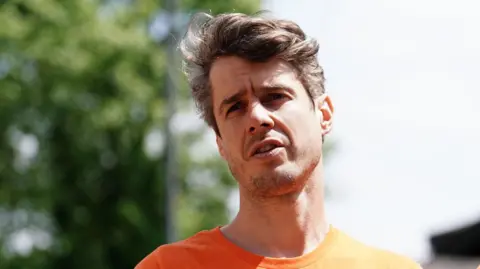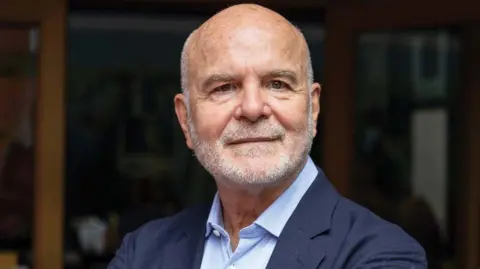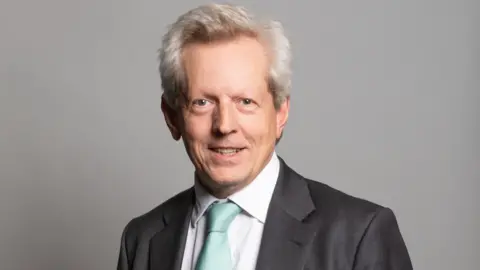Climate protest jail term deemed 'disproportionate'
 PA Media
PA MediaA human rights expert has described the year-long sentence given to a climate change activist as "blatantly disproportionate".
Dr Patrick Hart caused thousands of pounds worth of damage to fuel pumps during a Just Stop Oil demonstration in August 2022 and said he had done so because he believed the world was in a "truly dark and unprecedented time".
UN Special Rapporteur Michel Forst likened the UK's toughened laws on protesters to countries such as Honduras and Azerbaijan.
The Home Office said the UK had a "proud tradition" of peaceful protest but people should "do so within the law", with one Labour MP telling the BBC Dr Hart "deserved to be in jail".
Dr Hart, 38, was jailed in January after causing damage to 16 fuel pumps at Thurrock Motorway Services, in Grays, Essex.
The Bristol-based GP hit the pumps with a hammer, sprayed them with orange paint and obstructed lorries refuelling the station. He was sentenced to 12 months for criminal damage.
The cost of repairing the pumps was £9,376 and the action closed the pumps for a day while repairs were carried out.
It was one of a number of Just Stop Oil protests that sparked former Conservative prime minster Rishi Sunak to describe the campaigners as "selfish", adding those found guilty should "face tough sentences".
"It's what the public expects and it's what we've delivered," he said.
But Mr Forst said legislation over peaceful protest in the UK needed to be repealed as he believed it to be "draconian".

He said: "If you compare the situation in the UK with other European countries, you don't see such harsh sentences.
"In France you would receive a small fine, never prison. But in the UK peaceful protesters receive 12 months in prison."
On BBC Politics West, Swindon North MP Will Stone said there was no reason for the laws to be repealed by Labour.
He said: "This was not a peaceful protest, this is someone destroying property. Play stupid games, win stupid prizes."
Stone said Dr Hart "should be in jail" for what he had done, adding he disagreed with the views of the UN Special Rapporteur.
Dr Hart told the BBC, during a phone interview from prison, he believed his action had been justified.
When challenged about the seriousness of his offences and the possibility he would repeat them, Dr Hart added: "The way it is presented in the justice system is this is a pattern of offending which seems absurd to me.
"I am not doing this out of any benefit of my own. I am doing it out of entirely selfless reasons because I am terrified for human civilisation or the lack of a future.
"It is very unlikely I will go out and do the same things again."
'Greatest health risk'
Dr Hart said he believed his actions had been justified as the primary duty of a doctor was to "act in the best interests of our patients".
"I just came to appreciate the climate crisis is the greatest risk to all our health and anything else I can be doing is meaningless and the most meaningful thing I can do is to try to defeat that," he said.
"It's very odd to me that damaging inanimate objects is considered no longer peaceful.
"As a doctor, if it's an emergency and you are brought in unconscious, I am going to cut through your clothes – even if they are expensive designer, just to get to the wound, if it's bleeding and could lead to death.
"That is not considered violent, that is considered life-saving."
But former Conservative MP Richard Graham disagreed with his views, saying the protest "wasn't peaceful at all".
"This was an extremely expensive, aggressive, tiresome behaviour," he said.
"And very odd, frankly, from a GP who should be looking after patients in a very reasonable, apportioned way."

The Green Party's deputy leader on Bristol City Council said protests had made a "significant difference" to government policy.
Mr Forst said he had been "very moved" after a visit with Dr Hart in Chelmsford prison.
He has threatened to refer the British government to the compliance committee of the UN human rights committee if it does not respond fully to his legal opinion.
Additionally, Dr Hart also had his General Medical Council (GMC) registration suspended for an interim 12-month period, and faces a possible further suspension following his release.
"Dr Hart has already been punished by the UK judicial system for his climate activism," Mr Forst said.
"He has been prosecuted, convicted and sanctioned for his involvement in peaceful civil disobedience.
"One of the courts that convicted him also recognised that Dr Hart's motivations were entirely altruistic."
Mr Forst questioned what the GMC was trying to achieve "by depriving him from the very possibility to be a doctor".
He said it would be "punishing him for a second time, for having taken action to address what the GMC itself calls 'one of the greatest threats to human health'".
"Added to his conviction by a court, this professional sanction would not only be a form of penalisation, persecution or harassment of Dr Hart, it would also be one that is based on an astonishingly paradoxical reasoning," he said.
A GMC spokesperson said it was "committed to doing what we can to tackle climate change" but it was for Parliament to determine whether UK law relating to protests needed to change.
The guidance for doctors, the GMC added, was they were allowed "personal political opinions" but a custodial sentence would lead to a referral to the Medical Practitioners Tribunal Service.
"This is required by law, and we can't exercise any discretion over this," the spokesperson added.
"When doctors' protesting results in law-breaking, they must understand it is their actions in breaking the law, rather than their motivations, that will be under scrutiny.
"Patients and the public have a high degree of trust in doctors, that trust can be put at risk when doctors fail to comply with the law."
Follow BBC Bristol on Facebook, X and Instagram. Send your story ideas to us on email or via WhatsApp on 0800 313 4630.
